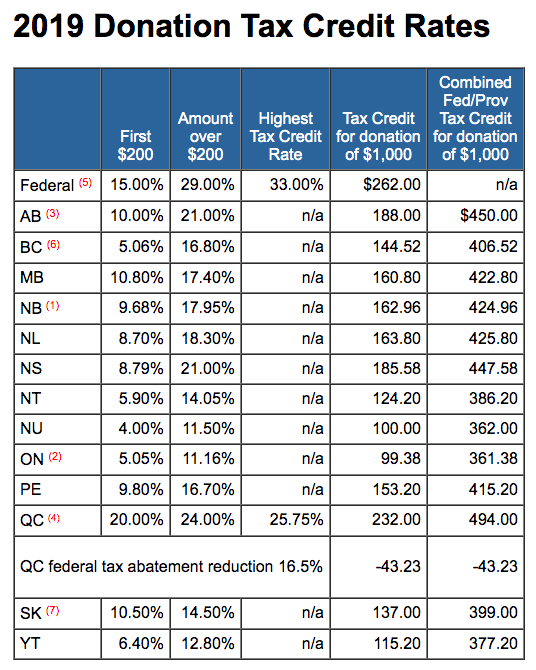‘Tis the Season to Give Back: Charity & Taxes
Debbie Bongard - Dec 09, 2019
In the true spirit of the holidays (and the upcoming December 31st deadline to make a charitable donation and receive a tax receipt for the 2019 year), it is helpful to revisit the details of how making charitable donations can reduce your tax liabil
‘Tis the Season to Give Back: Charity & Taxes

Between the overcrowded malls filled with cranky shoppers and the glitzy holiday parties, it can be easy to forget what the holiday season is truly about – giving back. In the true spirit of the holidays (and the upcoming December 31st deadline to make a charitable donation and receive a tax receipt for the 2019 year), it is helpful to revisit the details of how making charitable donations can reduce your tax liability.
All around the world, Canadians are proudly known for our politeness, compassion and willingness to offer a helping hand to one another. Based on these stereotypes, when it comes to charitable giving, one would think that we would be leaders on the international stage when it comes to charitable giving and humanitarian efforts. Let’s take a look at some statistics before claiming this title.
How charitable are Canadians?
The following statistics do not show how many Canadians give their time to various charitable efforts. Many non-profit or charitable organizations are sustained through the generosity and selflessness of individuals donating their time and effort to support a cause. The value of this should certainly not be underestimated. The reality is, however, that charities also require material resources and funding to keep their programs running and support their initiatives.
How many Canadians donate to charity? According to Statistics Canada, there were 26.4 million tax filers in Canada in 2016 (most recent numbers). 5.4 million (or 20.5%) of these taxpayers claimed charitable donations on their annual tax returns. It is important to note that this statistic may be slightly skewed because many smart taxpayers will claim all charitable donations on one spouse’s tax return to maximize the tax deduction they are eligible to receive. That being said, it is still safe to assume that only approximately one-third of Canadians donated to a charity that year.
How much ($) do we donate? The total donations reported in 2016 on an individual’s tax returns amounted to approximately $8.9 billion. While charitable efforts greatly vary among individuals, if we look at the median donation with the median income in Canada, we see that we only donated about 0.5% of our income to charity. This begs the question: should we be doing more, as compassionate Canadians, to support the charitable initiatives in our communities and empower our younger generations?
There are countless reasons why Canadians may be hesitant to donate their money. To many people, money represents safety and security, so giving it away may feel like a threat to their overall financial stability and wellbeing. The heightened volatility of the stock market in recent months may result in Canadians clinging to their money even tighter this holiday season.
While charity is mainly about helping others, the government of Canada has developed ways to incentivize giving by providing substantial tax-savings to charitable individuals.
Charitable Donations Tax Credit (CDTC)
The government of Canada has instituted a tax credit system that provides Canadians with generous tax-savings when they make donations to qualifying registered charities. A qualifying donee is a charity or public organization that satisfies specific requirements has been registered and approved by the Canada Revenue Agency and can issue tax receipts. To see if your chosen charity is a qualifying donee and will, therefore, allow you to claim your donation on your annual tax return, you can search for it on this complete CRA database.
Charitable donations are claimable in the form of money or the form of various other gifts including securities, ecologically sensitive land, certifies cultural property, capital property, personal use property (i.e. paintings, sculptures, jewellery, stamps, coins), and inventory (i.e. art, antiques, rare books).
The Charitable Donations Tax Credit (CDTC) helps to lower your taxes payable by giving you a tax credit of up to 29% of the amount you donated at the federal level, and up to another 24% of the amount, you donated at the provincial level (depending on your province of residence).
Federal tax credit. On a federal level, your CDTC will be 15% of the first $200 you donate, and 29% on any donation exceeding your first $200. For example, if you donate $1,000 in a given year, your federal tax credit would equal $262. That’s $262 you can save on your taxes payable.
Federal CDTC = ($200*15%) + ($800*29%) = $30 + $232 = $262
Provincial tax credit. Depending on your province of residence, you will have a different tax credit rate on your donation. See the chart below for what your province’s tax credit is. For example, if you are an Ontario resident, you are eligible to receive a tax credit of 5.05% on the first $200 donated and 11.16% on any amount exceeding $200. If you donate $1,000 in a given year (as in the previous example), your provincial tax credit would equal
Ontario CDTC = ($200*5.05%) + ($800*11.16%) = $10.1 + $89.28 = $99.38
On a donation of $1,000, you will receive a credit of $361.38 to reduce your annual tax bill.

Above: Federal and Provincial CDTC Rates for 2019
You can get a tax credit for all eligible donations to charities, up to 75% of your net income. This limit is increased to 100% of your net income on the year of your death (and the year prior). There are some circumstances in which this donation limit can be increased, for example, in the case when capital property is donated.
Tips to maximize your charitable tax credit
To claim your charitable tax credit, you have to report your donation on your annual tax return.
Accumulate multiple years. Donations that are not claimed in a given year can be carried forward for up to five years. Since larger donations (anything exceeding $200) provide you with a larger tax credit, it is a smart idea to accumulate claim multiple years’ worth of donations in a single year.
Combine donations with spouse. If you have a spouse, you can claim all charitable donations on one spouse’s tax return. This will result in a larger tax credit because you and your spouse will receive 29% on any amount above $200, rather than receiving a 29% credit on the equivalent of your first $400 (if you were to file separately). If you are doing this, the partner that earns the higher income should claim the charitable donations on their tax return. The higher-earner would fall into a higher income tax bracket and thus would benefit more from receiving the tax credit.
For your charitable donation to be claimable in the 2019 tax year, it must be made before December 31, 2019. With this deadline quickly approaching, it is worthwhile to give some thought to your tax liability for the 2019 year and strategize ways to maximize your tax savings.
Leading by example
Charitable giving will look very different among Canadian individuals and families. It is not necessarily the size of the donation that ultimately matters, but rather the act of giving.
A study from the United Nations Foundation showed that having discussions with your children about the importance of charity isn’t enough to instil a social-conscience in them. When parents pair these discussions with acts of service and donations, children are more likely to internalize the importance of compassion and regularly donate to charities in the future. Our charitable efforts are not only helping alleviate current issues, then, but also inadvertently contributing to future philanthropic efforts, as well.
In the spirit of this holiday season, consider putting your money towards doing something good for your community. Not only does it feel good to give, but it can also save you money when tax-time hits. If you want to claim any charitable tax credits for the 2019 tax year, ensure you don’t miss the December 31st deadline to donate. If you have unanswered questions about claiming charitable donations, please don’t hesitate to reach out to any of the team members at the Bongard Wealth Advisory Group.